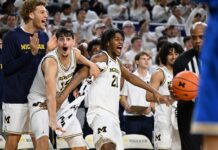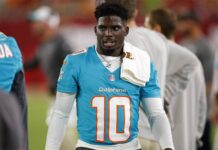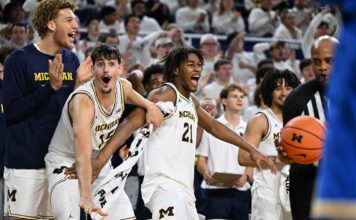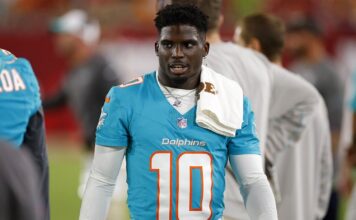
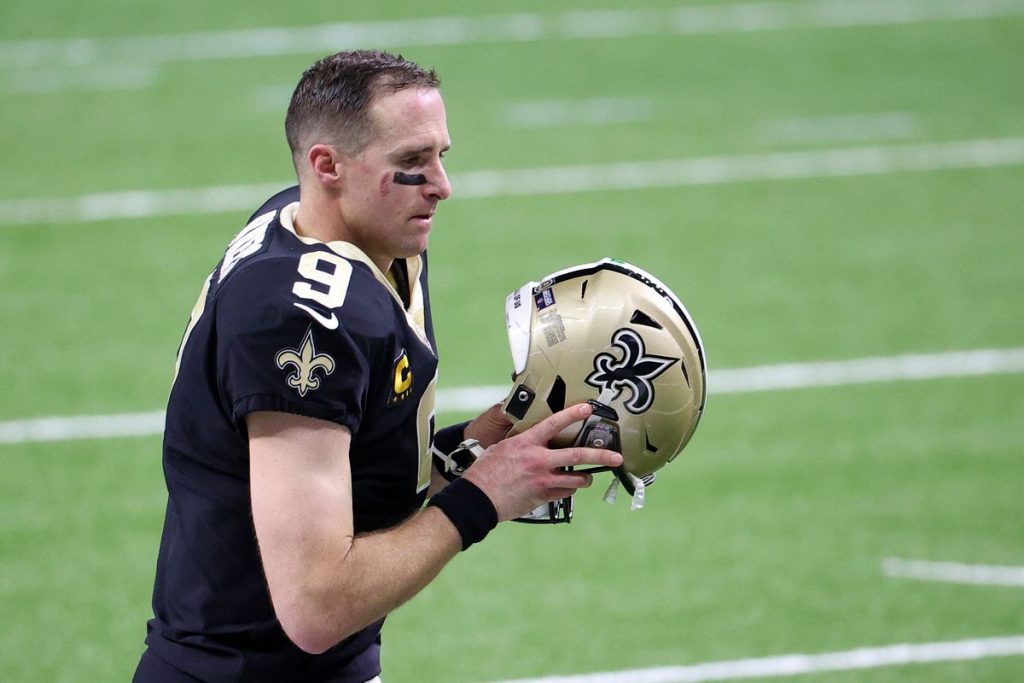
Drew Brees probably played his last game in the NFL Sunday night in a 30-20 loss to Tom Brady and the Buccaneers in the NFC Divisional Round.
News of Brees’ intentions to retire at the end of the season broke prior to kickoff Sunday and it certainly seemed apparent that the Saints’ QB was going to follow through on this decision judging from the amount of time he spent on the field after the game talking to Tom Brady and soaking in everything one last time.
The game itself for Brees would have been forgettable if not for the circumstances. If anything the way Brees played should’ve confirmed that it was time for the veteran QB to hang it up considering he was intercepted three times and threw for just 134 yards.
Still though, despite the poor performance in what will probably be his final game, Brees is undoubtedly a first-ballot Hall-of-Famer and one of the best quarterbacks to ever set foot on an NFL field.
Also, when you look back on Brees’s career, there may not be a single QB or player for that matter that had a bigger impact on the course of history in the NFL.
The Chargers decision to change everyting
It’s amazing how one draft could have such an impact — on well, everything.
The Chargers selected Drew Brees early in the second round (32nd overall) in the 2001 NFL Draft. The Chargers originally had the first overall pick but traded it to Atlanta (who took Michael Vick) in exchange for the fifth pick in the first round who they subsequently took running back LaDainian Tomlinson.
Brees spent his first season backing up Doug Flutie but took as the starter in 2002 after winning the job in training camp.
Brees’s future in San Diego with the Chargers, however, came into question after San Diego obtained NC State’s Philip Rivers and eventually committed a large sum of money to him.
Despite the writing essentially being on the wall that Brees’ time with the Chargers was probably going to come to an end sooner rather than later, he still played well holding onto his starting job in 2004 and 2005. After the 2004 season, Brees was franchised by the Chargers, however, after the 2005 season, a five-year, $50 million dollar contract offer wasn’t enough to secure Brees’s future in southern California.
The move that saved football in New Orleans and created a college football dynasty
During the last game of the 2005 season, Brees tore his labrum which resulted in the QB having to undergo arthroscopic surgery by Dr. James Andrews. This resulted in teams altering their approach to Brees in free agency and his suitors were eventually cut down to two, the New Orleans Saints and Miami Dolphins.
Now there are two very interesting aspects about both of these teams.
First, New Orleans as a city was just coming off the destruction and devastation of Hurricane Katrina and there was some serious thought as to whether the Saints were even going to return back to New Orleans or relocate to San Antonio — their temporary home while the Superdome was being repaired.
For Miami, the Dolphins were entering year two of a so far underwhelming Nick Saban era in South Beach.
Miami though was wary of Brees’ shoulder injury and weren’t ready to match New Orleans’ offer of six-years and $60 million to the free-agent QB. The Dolphins instead opted to go after Vikings QB Daunte Culpepper while Brees accepted the New Orleans offer.
It wasn’t just Brees though making his way to New Orleans as the team also brought on board former Cowboys assistant and Bill Parcells disciple Sean Payton who along with Brees helped reshape the Saints into Super Bowl Champions just three years later.
Now there’s a couple of questions here that have to be asked.
Obviously looking back, San Diego trading back to take Brees in the 2001 Draft and the Chargers eventually acquiring Philip Rivers in 2004 changed the course of history. But looking at the impact that had on New Orleans, you can’t help but wonder if Brees doesn’t sign in New Orleans do the Saints even exist to this day? Sure, I don’t think without the combination of Payton and Brees the Saints win the Super Bowl in 2009 but without either of them landing in New Orleans prior to the 2006 season the immediate success that year doesn’t happen and the Saints do in fact move to San Antonio.
For Nick Saban and the Dolphins, what happens if they actually decide to roll the dice with Brees and sign him instead of Culpepper who was benched after four games with Miami in 2006?
Does Brees actually bring success to South Beach and save the Dolphins from shuffling around starting quarterbacks during the 2006 season? Likewise, does that anticipated success with Brees mean Nick Saban never takes the head coaching job in Alabama in 2007 which probably means no Crimson Tide college football dynasty that’s still playing into effect to this day?
If Brees does go to the Dolphins and Miami has the immediate success that New Orleans ultimately had in 2006 I think there’s a very good chance Saban stays in the NFL.
Obviously, Saban was smart enough to realize things weren’t working for him in the pros and got out while his stock was still high. But let’s not forget, he already had a National Championship under his belt with LSU in 2003 and I’m sure that desire for a Super Bowl would have been even greater with an elite quarterback like Brees at his disposal.
If anything though, things certainly seem to happen for a reason and I’m sure all sides — except for the Dolphins are happy with the way things transpired. The Saints stayed in New Orleans and enjoyed a Super Bowl win and plenty of success in the Payton and Brees era. Meanwhile, Saban went on to Alabama where he eventually cemented himself as at the very least the greatest football coach in college football history.

